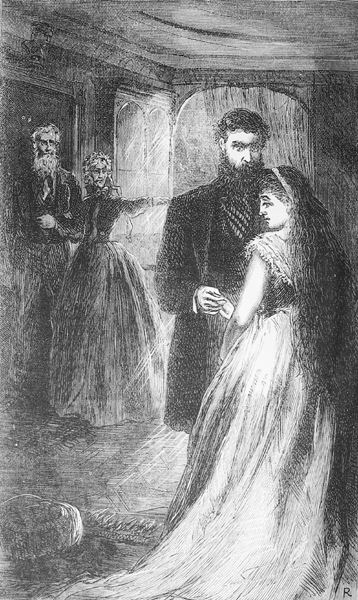
[Illustration: "These Are My Dearest Children."]
THECRYPTOGRAM.
A Novel.
By James De Mille,
Author of"The Dodge Club," "Cord and Creese," "The American Baron," etc.
WITH ILLUSTRATIONS
New York:Harper & Brothers, Publishers,Franklin Square.1872
CHAPTER I.
TWO OLD FRIENDS.
Chetwynde Castle was a large baronial mansion, belonging to thePlantagenet period, and situated in Monmouthshire. It was a grand oldplace, with dark towers, and turrets, and gloomy walls surmountedwith battlements, half of which had long since tumbled down, whilethe other half seemed tottering to ruin. That menacing ruin was onone side of the structure concealed beneath a growth of ivy, whichcontrasted the dark green of its leaves with the sombre hue of theancient stones. Time with its defacing fingers had only lentadditional grandeur to this venerable pile. As it rose there--"standing with half its battlements alone, and with five hundredyears of ivy grown"--its picturesque magnificence and its air of hoarantiquity made it one of the noblest monuments of the past whichEngland could show.
All its surroundings were in keeping with the central object. Herewere no neat paths, no well-kept avenues, no trim lawns. On thecontrary, every thing bore the unmistakable marks of neglect anddecay; the walks were overgrown, the terraces dilapidated, and therose pleasaunce had degenerated into a tangled mass of bushes andbriers. It seemed as though the whole domain were about to revertinto its original state of nature; and every thing spoke either ofthe absence of a master, or else of something more importantstill--the absence of money.
The castle stood on slightly elevated ground; and from its gray stoneivy-covered portal so magnificent was the view that the most carelessobserver would be attracted by it, and stand wonder-struck at thebeauty of the scene, till he forgot in the glories of nature thedeficiencies of art. Below, and not far away, flowed the silvery Wye,most charming of English streams, winding tortuously through fertilemeadows and wooded copses; farther off lay fruitful vales and rollinghills; while in the distance the prospect was bounded by the giantforms of the Welsh mountains.
At the moment when this story opens these beauties were but faintlyvisible through the fast-fading twilight of a summer evening; theshadows were rapidly deepening; and the only signs of life about theplace appeared where from some of the windows at the eastern endfaint rays of light stole out into the gloom.
The interior of the castle corresponded with the exterior inmagnificence and in ruin--in its picturesque commingling of splendorand decay. The hall was hung with arms and armor of past generations,and ornamented with stags' heads, antlers, and other trophies of thechase; but rust, and mould, and dust covered them all. Throughout thehouse a large number of rooms were empty, and the whole western endwas unfurnished. In the furnished rooms at the eastern end everything belonged to a past generation, and all the massive andantiquated furniture bore painful marks of poverty and neglect. Timewas every where asserting his power, and nowhere was any resistancemade to his ravages. Some com